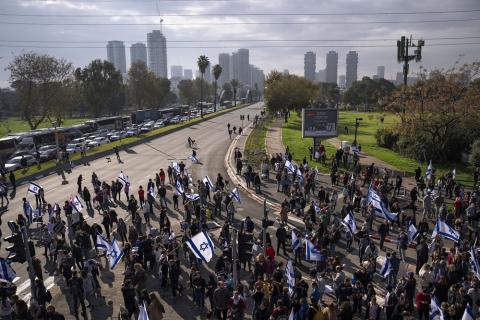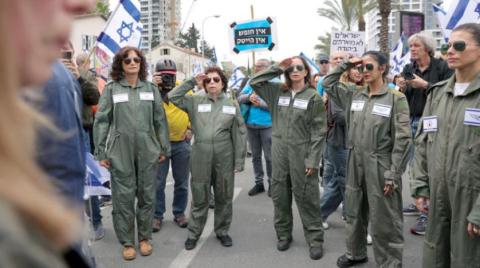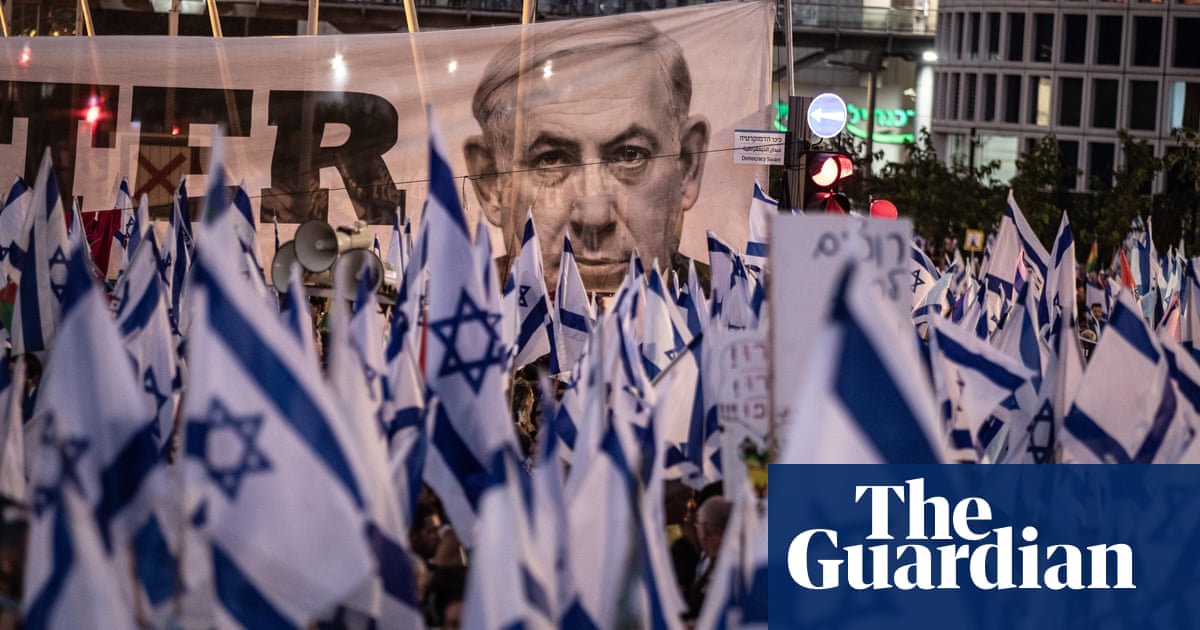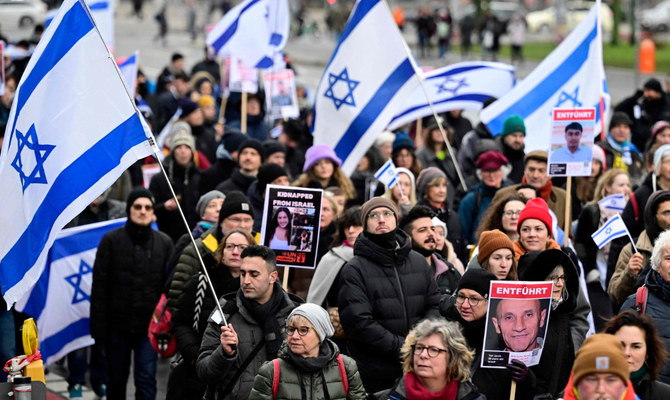
Thousands of demonstrators took to the streets outside Benjamin Netanyahu’s house over the weekend in what appeared to be the largest protest to date calling for the embattled Israeli prime minister to resign.
Rallies on Saturday night and into the early hours of Sunday morning were held in Jerusalem, home to the official residence of the 70-year-old leader, as well as his beach house in central Israel, near Tel Aviv, and at dozens of road intersections across the country.
Throughout the summer, Israelis have packed roads and squares calling for Netanyahu to resign, protesting against his government’s handling of the country’s coronavirus crisis and charges of alleged corruption.
At a cabinet meeting on Sunday, the visibly frustrated leader accused what he said was a “one-sided” news media of supporting the movement against him.
“These demonstrations are fuelled by a media mobilisation, the likes of which I don’t remember before,” he told ministers. “They are encouraged, allowed to paralyse neighbourhoods and block roads, in stark contrast to everything that was accepted in the past.”
He added: “They do not report the demonstrations – they participate in them. They add fuel.”
Later on Sunday, a Jerusalem court ruled that the prime minister’s son, Yair, 28, must remove a tweet that published names, addresses and phone numbers of protesters and called for people to demonstrate outside their homes.
The court also said he must refrain from harassing the protesters – some of whom said they had received threatening calls – for six months.
“Turns out that in our democracy you aren’t allowed to protest outside the homes of anarchists who have called to for the prime minister’s murder,” Yair tweeted after the ruling.
While Netanyahu has attempted to downplay and discredit the protest movement, it shows little sign of abating, with gatherings peaking at the start and end of the country’s weekend on Thursdays and Saturdays.
Hebrew media speculated that at least 10,000 people demonstrated in central Jerusalem on Saturday night, although it was hard to gauge the true size of the protest at a normally busy intersection.
Thousands marched through the streets, waving Israeli flags and blowing on horns. Others held banners that said “crime minister” and “go to prison”.
The local Black Flag movement, which has spearheaded the push for Netanyahu to resign and held protests for months, called the gathering an “unprecedented event”.
In a statement, it said those who flooded into Jerusalem “are not willing to accept the situation where a criminal defendant is crushing the dream upon which this country was established.”
The rallies are the largest since the 2011 “social justice” protests over the country’s high cost of living. Netanyahu is facing an ongoing corruption trial, on charges he denies, and allegations of undemocratic power-grabs to remain in office. The protests gained wider support following a recent surge in coronavirus infections that caused unemployment to soar to 21%, with public anger focused on the government response to the pandemic.
Israel imposed a swift coronavirus lockdown in March, but health officials have said the economy was reopened too hastily in May. Now, the country of 9 million people has reported more than 70,000 coronavirus cases.
Public frustration increased after the government announced last month it had been forced to reimpose some lockdown measures, including closing gyms, banning indoor dining at restaurants and stringent weekend shutdowns.
Netanyahu decided to give cash handouts to all Israelis, but the policy has been criticised as impractical, with one Israeli columnist describing the idea as the equivalent of “handing out bribes to the masses”.
Meanwhile, at recent protests, Israeli police have been accused of using excessive force, with officers tearing down signs and tents, dragging dozens of people into detention and using water cannon to disperse crowds.
However, they appear to have been less heavy-handed this week. By 2am on Sunday, most protesters had left peacefully, with only a few dozen refusing to leave. A police spokesperson said 12 people had been arrested in total for “causing public disturbances”.
Separately, small gangs of Netanyahu supporters affiliated with a far-right group have been accused of assaulting demonstrators during rallies. Late on Thursday, members of La Familia, an extremist gang of Beitar Jerusalem football club supporters, chanted “death to leftists” and “I hate Arabs”.
Police detained 16 from the group and attempted to keep the rest away from anti-government protesters, fearing a confrontation. Several threw stones at cars in the road and attacked a television crew, according to local media reports.
On Saturday, five people were also taken into custody for allegedly assaulting Israelis protesting against Netanyahu. In the northern coastal city of Haifa, police said they had detained a man who threw a stone at protesters, lightly injuring a woman. In the south, another man was arrested for spitting on a demonstrator.
As well as accusing the media of overplaying their significance, Netanyahu has labelled the demonstrators as anarchists boosted by his political enemies. Polls show his rightwing bloc retains significant support across Israel.
Nahum Barnea, a commentator for the country’s top-selling newspaper, Yedioth Ahronoth, said there “aren’t any signs yet” of Netanyahu’s support base turning against him.
“Nevertheless, he ought to be worried,” he said, noting the perseverance of the protest movement, the large numbers, and the potential for some rightwingers to change their opinion of Netanyahu if the movement gains further strength.
“When they thought he was successful, they voted for him,” Barnea wrote. “Now, in light of the economic crisis and the failed management of the coronavirus that he has displayed, they are looking at him in a different light. They don’t like failures.”












